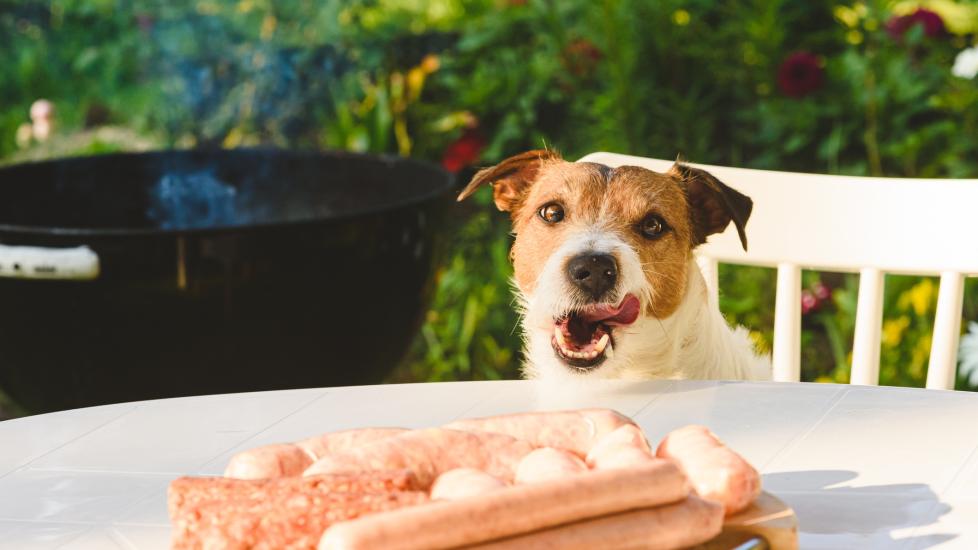Can Dogs Eat Sausage?
alexei_tm/iStock / Getty Images Plus via Getty Images
There’s nothing quite as tempting for Saturday morning breakfast as a sizzling sausage patty. Just add pancakes, and voila! You’ve got the perfect breakfast ... for humans, at least. But when it comes to your canine companion, not so much. As much as they’d like to share a savory bite with you, dogs should not eat sausage.
Is Sausage Bad for Dog?
Unfortunately, most kinds of sausage are not safe for dogs to eat and should not be offered as a treat. This goes for breakfast sausage, Vienna sausage, and sausage made in all forms—links, patties, and crumbles are all no-goes for Fido.
That’s because many ingredients found in sausage are not good for dogs. Sausage is made by combining ground meat, fat, spices (including garlic, which is dangerous for dogs), and other ingredients that can be harmful for our pups.
Unlike other protein options like plain chicken or ground beef, sausage is high in fat and sodium. Too much of either can lead to serious (and painful) health conditions in dogs, such as pancreatitis.
Even worse, sausage often contains seasonings like garlic, onion, or other spicy additives that should always be avoided. These sausages can make your dog very sick and should never be shared with your pup.
While a small nibble of plain sausage is not likely to cause your dog serious harm, there are much safer ways to offer a boost of protein to your dog’s bowl. Plain chicken, turkey, salmon, beef, and lamb are much better options for your dog instead of sausage.
Can Dogs Eat Bratwurst?
This German-style sausage is similar to other types of sausage that are not good for dogs and should be avoided. Bratwurst contains added spices like onion or garlic, which are toxic to dogs. The high-fat content and other additives also mean it should be avoided.
My Dog Ate Sausage. What Do I Do?
If your dog has managed to snag a piece of sausage, how to proceed depends on a few factors.
1. Determine How Much and What Kind Your Dog Ate
The amount and type of sausage your dog ate makes a difference in what to do next. A healthy adult dog that’s eaten a small piece of unseasoned sausage will probably be fine. If you know your dog has eaten some sausage, monitor them and call your vet for advice.
2. Watch for Symptoms
If your pooch shows any signs of digestive upset, call your vet for guidance. This includes vomiting, diarrhea, lack of appetite, and lethargy.
If your dog ate a large amount of sausage or they appear distressed, contact your vet ASAP. They can advise on next steps based on your dog’s situation.
What To Feed Your Dog Instead of Sausage
While sausage is not safe for dogs to eat, there are plenty of dog-friendly, healthier options to consider instead.
But take note: Even though the following foods are considered safe for healthy adult dogs, always be mindful of amounts. A general guideline is the 10% rule: Treats (even the healthy ones like these) should make up only 10% of your dog’s calories. Their primary nutrition should come from a well-balanced dog food that’s made specifically to meet their nutritional needs.
Alternative treats to offer instead of sausage include:
-
Plain chicken or turkey: Plain, unseasoned chicken and turkey (with the skin and bones removed) are lean protein options that are tasty, safe alternatives to sausage.
-
Cooked veggies: Raw or steamed vegetables like carrots or green beans are a crunchy, nutritious alternative to sausage.
-
Specially made dog treats: There are a variety of sausage-style dog treats that are formulated just for pups to enjoy, if you want to give them their own “sausage” snack.
Anytime you have questions about your pup’s nutrition needs, talk to your vet about whether or not certain foods are safe for dogs. They can help you choose new foods that your pooch can eat safely.
